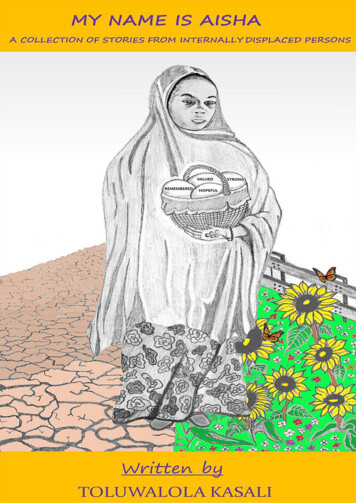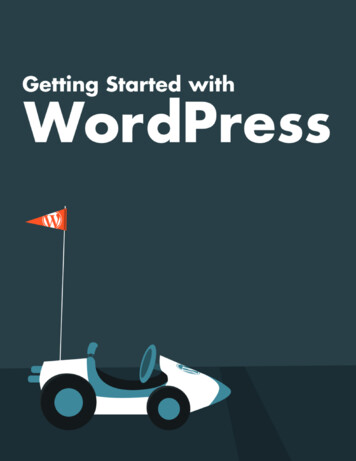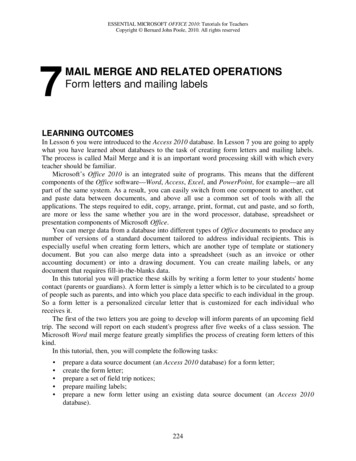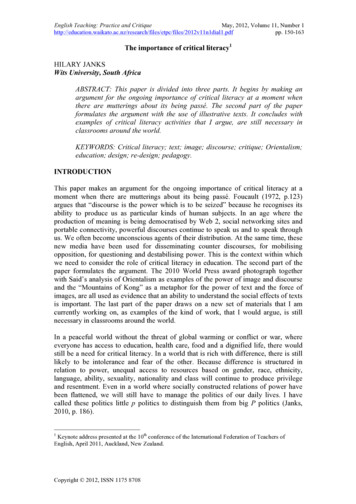
Transcription
MY NAME IS AISHABy Toluwalola KasaliISBN: 978-978-56673-4-9Copyright 2019All rights reserved. No part of this book may be reproduced, stored in a retrievalsystem, transmitted in any form or by any means - electronic, mechanical,photocopying, recording, or otherwise in whole or in part without priorpermission in writing from the copyright holder. The only exceptions are briefquotations in printed and online reviews.Stories and pictures used in this book have been published with the permissionof individuals and leaders at Area 1, IDP Camp, Abuja, Nigeria. All images belongto My Internally Displaced Persons. Some of the discussions and interviews weretranslated from the Hausa language to the English language.All figures published in this book with regards to Internally Displaced Personsare from the IOM UN Migration, Displacement Tracking Matrix, Nigeria, Round25 Report for October 2018. This holds true unless otherwise stated.Disclaimer: This book is a collection of real-life stories. It reflects the people'srecollection of their experiences over time. Some events have been compressedand summarised. No names have been changed, no characters invented, noevents fabricated. Aisha is a representation of people who have been displacedby armed conflict.2
The objective of this book is to bring you on a short journey to view the worldthrough the eyes of people that have been forced to flee their homes as a resultof armed conflict. It aims to educate and create awareness on the plight ofInternally Displaced Persons (IDPs), who are victims of the BokoHaramInsurgency in North-East Nigeria. It chronicles real-life stories of peopledisplaced from Borno, Adamawa and Yobe States in 2014 who now live in theArea 1 IDP Camp, Durumi, Abuja. A large number of people living in this camphave been displaced from Bama and Gwoza communities in Borno State, Nigeria.3
TABLE OF CONTENTSMore than a statisticIntroductionChapter 1: Sharing their storiesChapter 2: Displacement is not a choiceChapter 3: Where is my home?Chapter 4: Mental Health - the invisible scars of conflictChapter 5: Remember me tooChapter 6: Their dreams are valid tooChapter 7: Note from the authorHow you can helpAcknowledgementsAbout My Internally Displaced PersonsConnect with the author4
I HAD A HOME, FRIENDS, FAMILY,EDUCATION, AND A COMMUNITY ONE DAY, ALL OF THAT CHANGED.AISHAAISHA REPRESENTS A PEOPLE WHO HAVE BEEN DISPLACED BY ARMED CONFLICT.Internally Displaced Persons refer to persons who have been forced to leave their homes asa result of armed conflict, situations of violence, violations of human rights or natural disasterswho have not crossed an internationally recognised state border11Internal USAID document: USAID Assistance to Internally Displaced Persons Implementation Guidelines.5
MORE THAN A STATISTIC2,026,602 displaced individuals in North-East Nigeria as at October2018.91% of displacements are due to the ongoing conflict in North-EastNigeria.3 States have the largest IDP population; Adamawa, Borno, and Yobe.60% of the IDP population live in host communities.40% of the IDP population live in IDP camps and camp-like settings.54% of the IDP population are females.46% of the IDP population are males.79% of the IDP population are vulnerable women and children.27% of the IDP population are children under 5 years.Sources: IOM UN Migration, DTM, Nigeria, Round 25 Report, October 2018.6
“If the numbers were faces, they would look just like you and me.”A cross-section of people at the Area 1 IDP Camp, Abuja.7
INTRODUCTIONIt started off as a typical day in Gwoza, located in a Local Government Area ofBorno State, in North-East Nigeria. The rocky and hilly terrain, providingbeautiful scenery. My parents were at home, and my siblings were playing outsideas usual. I was washing my clothes inside the house when I started hearinggunshots. I called out to everyone, and we tried to see what was going on. Thatwas when we noticed men moving into our village in large groups. At first, wethought they were soldiers who had come to protect us because they came intrucks, but later, we realised that the gunfire was coming from BokoHarammilitants who were engaging soldiers in battle. Everyone was running, and weknew it was no longer safe to stay in the house. So, I left with my siblings andparents; we ran to the hills and stayed there hoping that the militants will retreat,but they did not – they had taken over our town. They killed our men, destroyedour property, farmlands and went away with valuable items. Living in themountains, we ran out of food and water and survived by eating dry Guinea cornand Millet. It was not long before we realised that we would not survive muchlonger if we continued to stay, so we decided to leave the village. We had heardof people being killed as they tried to flee town, but we were left with no otherchoice.We left in the rain carrying only some of our belongings and followed a path thathad some people on it. We dressed my brothers in female clothing and coveredtheir heads because if they were identified as men, they would have been killed.We helped to disguise many other men, but some of them were discovered andkilled - my brothers were able to escape. We were stopped twice along the wayby militants; they collected our identity cards, phones and the little money wehad and were allowed to continue our journey. At some point, they startedchasing us, and we ran for our lives.8
Many men were killed, and some died of hunger while hiding from the militants.Young girls and women were taken away.Finally, we got out of the village trekking by foot from Gwoza to Madagali, a localgovernment area about 15 miles away in Adamawa State; we were tired, thirsty,hungry and dirty. Our feet were swollen and pierced by thorns. We stayed therefor two days and did not have money to continue our journey. Later, a bus wassent, and we were brought to the Internally Displaced Persons (IDPs) Camp inArea 1, Abuja. The story is not very different for many of us. My family and Ihave been displaced since 2014.9
CHAPTER 1SHARING THEIR STORIESI want to share my story, I want my voice to be heard.10
“We were living peacefully inGwozabeforeBokoHaramarrived. I was able to escape, butmy father and brothers werekilled. My friend was taken awayinto the forest - I still don't knowif she is dead or alive." -Hafsatu.“My husband went into hiding, andby the time we found his hideout,he was dead – he died of hunger. Ialso lost my daughter to hunger,and I cried. There was no food, nowater, and no soap to wash ourbodies. There was nothing goodaround us." -Hadiza“We ran out of food on themountain and sometimes ate drymillet to survive. There was awoman who used to bring uscooked beans on the mountain,but she got shot and died from herwounds. We were left with nohelp." -Halima“I was three months pregnantwhen they came to my village andkilled my husband. Theydestroyed our lives and property.We have nothing left." -Zara“There were very few men alive inthe town. The women were left tobury the dead. For those who arestill missing, we look forward tohearing from them, but we haveheard nothing. If security isguaranteed, I want to go back tomy village." -Halima“I came to the camp because ofthe problems in Borno State. Idon’t have a job, and my husbandhas nothing to do as well.Sometimes, I find it difficult to feedmy children." -Aisha11
“I moved to the camp with my“I moved to the camp because ofparents and five siblings because ofthe insurgency in Maiduguri. I amno longer in the crisis, and thismakes me very happy. This meansI can now go back to school andlearn.” -Elizabeththe crisis in Maiduguri. I lost myparents and siblings – I am aloneand have nobody to call my own. Iwas depressed when I firstarrived, but now, I feel better. Iwant to be trained so I can go toschool and feed myself.” -Amidu“I felt helpless when I first arrivedat the camp. I had sleepless nightsand feared the unknown. To makeit worse, my husband losteverything – But now, I can seethings getting better because I amacquiring skills. I still worry a lot.”-Fatima“I came to the camp because of“I am here alone with my childrenthe crisis in Maiduguri. Now, Ineed to be empowered – we needpeople to help us. Currently, I sellfuel in litres to people around thecamp. I also run errands for thecamp leader.” -Bubabecause my husband went toLagos to look for a job. I have nojob, and I worry about feeding mychildren. I am happy to bereceiving some training now.”-Blessing“I lost my parents, and I have nothad a job since I came to thecamp. I have nothing to do."-Hamza12
CHAPTER 2DISPLACEMENT IS NOT A CHOICEI will go back to my village if security is guaranteed.13
“I liked life at home, it was very peaceful before the attacks.”Life was peaceful at home before BokoHaram invaded our town and I lookforward to going back home someday. We had to leave everything behind,enduring a long and dangerous journey to escape our attackers. The first fewyears living in the camp were very tough; we were exhausted, frequentlyexperiencing flashbacks, feelings of isolation, depression, and hopelessness. Itwas hard to understand why this happened to us - we did not choose to be here.We were faced with our new reality which was hard to accept; everyone hadlost someone or something they loved dearly in the violence, and many of ushad lost the zeal to go on with life. Here we were, several miles away from homeand expected to start all over again.This was not the life we imagined. Everything was going on fine at home, wewere in school and happy but now, our education has been disrupted, and ourlives seem to have been put on hold.“I was in class 4 when I fled my village, I have not been to school since then. Last year,I got married, and now, I have a 5 months old baby. I still dream of going back toschool.” - FatimaWe stayed here for many months before people knew our camp was locatedhere in Area 1. It was challenging for us, and we suffered very much but now,people know about us, and we receive support. We rely on donations fromprivate individuals and organisations to survive. When we receive reliefmaterials, the camp chairman keeps it in the storeroom until distribution daywhen we are organised in groups of twenty with each person representing ahousehold. Our camp is close to the town which makes it easier to access, andI know that there are people in other IDP camps in Abuja and the North-Eastthat are not getting as much support as we do in Area 1 because they are noteasily accessible due to poor road access or distance.14
For many of us, the camp has provided relief from the attacks and violence wefled but more has to be done to ensure that we don’t stay in this place for toolong. We need economic opportunities to enable us to earn a living and becomefinancially independent.We also have to help ourselves; the female camp leader assists the women inthe delivery of babies in their homes. She serves as a community health extensionworker supporting women mostly with her own resources. Sometimes she saysto us, “My birthing kit is finished, I no longer have gloves, but I have to go on. Thewomen need me.” She is selfless in her service to others in spite of her situation.It is hard not to think about home. BokoHaram took away some of our people,and we still don't know where they are. Also, we left some of our people whowere too old to run in the town. We keep hoping to receive news about them,but up until now, we have no information.It has been five years since we fled our homes to safety. So many times, I dreamabout going back home - people have tried, but they had to come back.I waitfor the day when it is safe enough for us to return.15
“Displacement is not a choice.”My name is Idris Ibrahim. I am 65 years old, and I have been displaced in Abujasince 2011. I am the camp coordinator in Area 1, IDP Camp. I was born inAdamawa but brought up and lived in Adamawa, Borno and other States inNigeria.I am a trained teacher and also taught in administration. I attended clericalschool and worked with Ministries (the Public Service) in Maiduguri. After this,I went on to study Television Journalism – I am an ex-student of the school ofjournalism.I was a pioneer staff of Nigerian Television (popularly known as NigerianTelevision Authority) when it was founded in 1976. I was also into publicrelations and lived and worked in Lagos State for 17 years.I voluntarily retired home in 2005 by which time, BokoHaram had reared itsugly head. I had no choice but to find a way to escape the insurgents – this ishow I found myself in Abuja. Displacement was not my choice.16
CHAPTER 3WHERE IS MY HOME?A place I must call home17
“We have been here for many years."We have a place to lay our heads, but it is not comfortable. Sometimes, you havetwo or three families sharing a shelter. The weather brings its challenges too,and we need better materials to build stronger structures. The spaces areovercrowded with poor ventilation. During the wet season, some of the sheltersget destroyed, and it gets very hot in the dry season.We know that this is a temporary arrangement. At the end of it all, we need aplace to call our home.18
Camps and campsites are intended to be temporary settlements until IDPs areresettled. However, some displaced persons have been living in camps for overthree years because they are not skilled and/or adequately equipped to moveon, highlighting the need-gap between the early phase of displacement and longterm reintegration into the society. The increasing number of IDPs is alsoputting pressure on existing facilities, negatively affecting living conditions andcausing avoidable ill health amongst the people. A solution gap exists betweenthe early phase of displacement and long-term rehabilitation and to close thisgap, a multisectoral approach is required. The multisectoral approach focuseson the overall well-being of displaced persons during the period ofdisplacement including meeting their mental and physical health, education andsocial needs. This is aimed at preparing and equipping them for reintegrationinto the society with dignity. Doing this effectively requires taking a holistic andcoordinated approach, bringing together different organisations and agenciesbased on their mandate and expertise - humanitarian, social, governmental, andnon-governmental organisations. This coordinated working system will reduceinefficiency, resource mismanagement, duplication and wastage.When the period of displacement is prolonged as it is in many cases, aprotracted phase of anxiety and uncertainty is created.19
Camps should be run by professionals who understand the nature of the crisisand can provide ‘needs-driven’ solutions in responding to the specific needs ofIDPs.The drivers of insecurity and conflict must be addressed to make the issuesof a potential return to the place of origin or other settlements sustainable.20
CHAPTER 4MENTAL HEALTH – THE INVISIBLE SCARS OF CONFLICTSome scars cannot be seen.21
“When I first arrived in the camp, I had nightmares about people that were killed Isleep a bit better now.”Even after fleeing to safety, I was afraid that BokoHaram will come back to killme, but I am safe now. I experienced a lot of pain and suffering – they killed mypeople and our town was destroyed. I saw blood flowing everywhere, and thewomen were left to bury the dead. Those images keep playing back in my mind.I can tell you that some people are still grieving; they get angry and fight overlittle issues, and when you ask them what is wrong, you realise that they aredealing with other troubles they don’t want to talk about. I think sometimes, allwe need is someone to talk to and advise us.“I like it when people come to the camp to talk and listen to me share my problems.It makes me feel like people care about me.” -ZainabuThe truth is that many of us don’t even recognise that we need help. When youlook at us, you cannot tell what is happening. Let me tell you a story One of our women was going about her normal day, walking by the sideof the road. Unknown to her, she had been talking to herself and making handmovements while walking. A man in his car was watching her from a distanceand decided to intervene. He came to speak with her and explained what henoticed. She was in shock because she had no idea, she was talking to herselflet alone, making hand movements while walking. She tells us that she losther husband in the crisis and is responsible for taking care of herself and herchildren. She says the violence she experienced affected her, but she did notrealise how much of an impact it had on her. This was happening to ourfemale camp leader. She said, “see me, I am well dressed, you will neverimagine I am going through this.” There are many more like me going throughthis stress.22
Sometimes, we face problems we cannot tell anyone about.“I have problems with my breast, but I have not told anyone because I am afraid ofwhat people will think of me.” -Blessing.Conflict and violence have an effect on mental health. Mental health is asubject many people shy away from, but it is critical to overall well-being.23
We have similar stories from other people living in the camp.“I came to the camp depressedand very sad because I lost mysons and husband. I alsodeveloped high blood pressure. Ihope to learn skills that will helpme earn a living.”“I lost everything, and I don’thave a job. Sometimes, I find itdifficult to eat. The things I saw inthe crisis keeps coming back tome – I find it difficult to sleep andfeel dizzy when this happens.”- Binta- Zainab“I find it difficult to sleep attimes. When I start gettingworried or thinking, my bloodpressure rises.”“I lost my husband, and this hascaused me pain and sleeplessnights. I worry about what mytwo children will eat. I find solacein sitting with my neighbours andtalking. I also pray.”- Halima- Mariam“I came to the camp depressedbecause my father was killedduring the crisis and left me withmy siblings. I have left everythingto God. Now, I have hope. I amhappy to be getting trained.”- Zainabu“When I came to the camp, I hadmany fears and dreams, but I amdoing better now.”- Ladi“I was heavily pregnant duringthe crisis but lost the baby afterbirth. I got pregnant but lost thebaby again. Doctors advised meto stop thinking and take care ofmyself. I am now pregnant.”- Sarah“I lost my brother in the crisis,and my father died because ofwhat happened to my brother. Ilive in fear and cry sometimes. Iam trying to let go becausethinking gives me problems.”- ZainabuThe pain and trauma do not disappear without a supported healing process– If allowed to linger, unresolved emotional and mental issues will causegreater harm in the future, for the individual and society at large.24
The stigma and isolation that comes with speaking out creates a barrier andholds people back. Stop the stigma!We can help by choosing first to understand their state of mind; where theyhave been and what they have been through and working with them tooffer needs-driven solutions, not a one-size-fits-all offer.25
WHAT DO THEY NEED?Trained health and communityhealth extension workers.Early mental health support andintervention – trauma counselling,professional and religiouscounselling, etc.StigmaPeer group support andpsychosocial support.Follow-up and start again.26
CHAPTER 5REMEMBER ME TOOI have invisible scars too.27
“The soldiers fought the BokoHaram militants to protect us.”The soldiers engaged the BokoHaram militants in a gun battle, but the rebelskept increasing in number. The soldiers suffered too When we talk about victims of conflict, it is easy to focus on lives that havebeen lost and the people who have had to flee their homes to safety but, whatabout the soldiers fighting to protect them? The soldiers live away from theirfamilies for many months and are also exposed to traumatic circumstances;they are engaged in armed conflict and have to fight. They go into battle withthe knowledge that they might not come out alive. While the physical injuriessustained are obvious to the eyes, the emotional and mental scars are hiddenand follow them around. If soldiers are redeployed to a non-conflict zonewithout receiving appropriate help, they carry the invisible wounds around,affecting the way they respond to their friends, families and communities. Manytimes, the people who return to their families are shadows of themselves.Their minds are troubled by what they have experienced; they remember theblood, dead bodies and can recall their faces. This is disturbing to many andlingers in their hearts and minds. It is not enough to deploy soldiers, thereshould be emotional and mental health support available to all soldiers bothduring and after deployment. There should also be a system to track andfollow-up on soldiers who have been moved from a conflict zone to ensuretheir overall well-being. They fight for us in the battle, and we must fight fortheir welfare. The mental health of our Army personnel must be prioritised.THANK YOU TO ALL MEMBERS OF THE NIGERIAN ARMED FORCESFIGHTING IN NORTH-EAST NIGERIA.28
CHAPTER 6THEIR DREAMS ARE VALID TOOI want to create a better future for myself.29
“We lost our jobs, income, farmlands and businesses. We have to start all overagain.”Many of us don't have jobs, and the idleness is affecting us. Usually, when I getbusy, it helps me to stop thinking. If we have something to do, then we canprovide for ourselves and our families. Before now, some of the women wereselling local caps, beans and groundnut cake. We need to be engaged andempowered.“Being busy makes me forget about my problems.” -Aisha“I was making and selling local caps when I was in Borno State, and I am happy tolearn other trades.” -HadizaIndividuals and organisations come to the camp sometimes to train some of usin skills like soap making, hair making, mechanic work, tailoring, and bead making.Some of the young men ride motorbikes to earn a living (carry passengers at afee from one location to another). They are able to move outside the camp tofind customers, but most of them want more out of life; equipping us means thatwe can realise our dreams and become whoever we want to be.“I am currently in JSS3 and dream of becoming a fashion designer. I plan to take theCreative Art subject in senior school, so I can become a fashion designer”. I want tofocus on dresses.” -ZaraWhen people come to help and train us, we feel very happy – it gives us hopefor the future."If I can achieve my dream of being whoever I want to be in life, that will make mehappy. I have hope when people come to help us." -AdamaRashida dreams of owning a salon in high-brow areas in Abuja.“Now, I look forward to opening my hair salon in Asokoro or Maitama in Abuja; I willcharge N500 only for everything including hair attachment.” - Rashida30
"We are acquiring skills to prepare us for the future."We should empower IDPs through education, skill acquisition and trainingto develop a sustainable means of livelihood, as well as regain dignity.31
Internally Displaced Persons need to be prepared and equipped mentally,socially and economically while in camps for reintegration into the society.32
"I am happy to be learning skills that will help me tomorrow.” -HauwaWhen we invest in people socially and mentally, we improve their productivecapacity - they become self-reliant and can support their families.33
CHAPTER 7NOTE FROM THE AUTHOR34
Displaced persons have suffered a great deal; witnessing the death of loved ones,destruction of lives and property and abuse. They endure long, dangerousjourneys to escape their assailants and find themselves exposed and vulnerable.In many cases, children lose both parents in the process, becoming heads offamilies, providing for themselves and their siblings.With such traumatic experiences, people report flashbacks and nightmaresleading to Post Traumatic Stress Disorder (PTSD). The loss of loved ones usuallyleads to depression, feelings of isolation and hopelessness.Too often, however, food, water and shelter are defined as the sole primaryneeds, ignoring the devastating effects of conflict and violence on mental health.Displaced persons experience grief, loss of economic opportunities and a senseof self, a breakdown of cultural identity and family structures. Thesesocioeconomic stressors put an immense strain on the mental health ofindividuals. We can help to meet their basic needs while also preparing them tosurvive mentally, physically and economically.In providing the help they need, access to mental health care is a major challenge– the high cost of services, the limited number of health professionals, remotelocations, etc., create a treatment gap for mental disorders in IDP camps. Theassociated stigma and fear of isolation mean many cases are unreported. Thesefactors raise the need for psychosocial support to be incorporated as part of theimmediate humanitarian response.From my experience, there are also social and behavioural effects ofdisplacement. Their mindsets are shaped by past experiences and currentcircumstances. Their actions are a departure from what might be consideredthe norm. But how do we define “normal” in a situation where normal hasceased to exist for many? Using an example of two camps for displaced personsI visited, I observed that in the first camp, which is close to town and receives a35
regular supply of relief materials, the people were conscious about safety andorder and waited patiently for distribution of relief materials to be completedbefore collecting their share. However, at the second camp, with poor roadaccess and irregular supply of relief materials, a fight broke out immediately afterthe distribution – there was a scuffle for available supplies, and their instinct wasto fight for their basic needs. It was the "survival of the fittest" - desperation,hunger and need.For the human mind, basic needs are for survival and safety. However, securitycan only matter when the basic needs of food, water and shelter have been met.Insecurity in IDP camps where they should feel safe leaves them with little choicebut to flee again, and as a result, many have been displaced more than once. Forthose living in host communities, conflicts arising between displaced persons andthe host communities can be mentally and socially unsettling – many times,members of the host communities feel their needs are just as valid and want ashare of relief materials, further raising tensions. This situation should not beallowed to linger, and for that to happen, we must provide economicopportunities that enable displaced persons to earn a living sustainably.When the period of displacement is prolonged as it is in many cases, a protractedphase of anxiety and uncertainty is created. The drivers of insecurity and conflictmust be addressed to make the issues of a potential return to the place of originor other settlements sustainable.Women and children represent a high percentage of this vulnerable group. Thewomen suffer different forms of exploitation when in need of essential items,with very few channels of expressing or reporting these grievances and abuse.Increasingly, we have a duty to ensure that people are not held under a differentform of oppression after fleeing violence and captivity. The effects on the mind36
are unseen, but nevertheless, detrimental to their ability to recover and regaintotal freedom.The issues of displacement are multifaceted, and as such, a multisectoral,comprehensive and collaborative approach is required; bringing together socialand humanitarian workers, health workers, counsellors, psychologists, securityagencies and governments.Mental assessment and counselling sessions which include trauma counselling,professional, religious counselling, etc., must feature prominently in oursolutions. Access to mental health services must also be prioritised for funding.Unresolved mental health issues have dire consequences which if allowed tolinger, can cause greater harm to the society in the future. We can help bychoosing first to understand their state of mind; where they have been and whatthey have been through, working with them to offer needs-driven solutions, nota one-size-fits-all offer.We must help rebuild their lives, so they are no longer viewed as burdens tothe society. IDPs display characteristics of resilience, courage, and strength ofmind to thrive, and have employed an admirable set of skills to survive. We mustrecognise and harness their potentials, empowering them to becomecontributors to social and economic development within their host communitiesand State. Dignity can and must be regained for our displaced population.There are huge costs associated with internal displacement, which are not onlyto the individuals affected but also to the economy, political stability and security.The underlying causes of displacement must be addressed with a lot more effortput into preventing displacement, protecting people, and finding long-termsolutions.The road to full recovery and resettlement is long but achievable, and theprocess must begin urgently. There is no harm in falling, but there is great harm37
in staying down. There is great potential in every individual, and they must begiven the opportunity to realise their dreams.38
HOW YOU CAN HELPThe future is here, and the difference between where they are now, and theactualisation of their dreams is dependent on what we do to lift them up today.I know that the statistics can be overwhelming, but we must start now. You donot have to look too far to find people who have been forced to flee their homes,and people who have moved to different states across Nigeria in search of help– someone in need might just be right next to you. Here are practical ways inwhich you can help: Learn more abo
my father and brothers were killed. My friend was taken away into the forest - water,I still don't know if she is dead or alive." -Hafsatu. “My husband went into hiding, and by the time we found his hideout, he was dead –he died of hunger. I also lost my daughter to hunger










